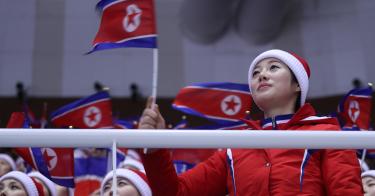North Korea’s Olympic charm offensive was everything Pyongyang could hope for. A global television audience watched transfixed as athletes from both North and South walked together under one, unified flag on opening night. Even though the combined North-South women’s hockey team lost badly to Sweden, news reports focused on the novelty of North and South Korea’s leaders watching the action together. Meanwhile, the media just couldn’t get enough of the 200 North Korean cheerleaders.
All this left many hoping that this could herald a new détente between the two countries – especially after Kim Jong-un extended an invitation to South Korean President Moon Jae-in to visit North Korea.
But those hopes are doomed to be disappointed and should never have been raised in the first place. Given Pyongyang’s deplorable human rights record, North Korea should not have been permitted, much less encouraged, to participate in the Olympics.
Apartheid-era South Africa was barred from the Olympics on the grounds that nations who engage in gross violations of human rights are not worthy of participating in an international event that celebrates human excellence. North Korea deserves the same treatment.
A 2014 United Nations report on human rights conditions in North Korea found evidence of crimes against humanity. Some 80,000-120,000 North Koreans are held in death-inducing political prison camps where they are subjected to back-breaking labor and abysmal conditions.
Even the average North Korean is denied basic rights such as freedom of speech, freedom of movement, and freedom of religion. For example, North Korea is known as the world’s worst persecutor of Christians. Mere possession of a Bible is often grounds for death.
North Koreans who flee to China are frequently forcibly repatriated by Chinese authorities (in violation of international law). Any of these would-be refugees who are found to have had contact with South Koreans or Christian missionaries face far worse torture and longer imprisonment from the regime.
Beyond abusing its own people, North Korea currently holds three U.S. citizens hostage: Tony Kim, Kim Hak-song, and Kim Dong-chul. And the world remembers University of Virginia college student Otto Warmbier, released from a North Korean prison, comatose, only days before he died from maltreatment.
The Warmbier case made the regime’s human rights abuses all-to-real to many Americans. Otto Warmbier’s father, Fred, was a part of the U.S. Olympic delegation led by Vice President Pence. His presence at the Olympics was an important reminder of the Kim regime’s brutality. Let us hope it prompts the U.S. government to continue pressing for the release of the three Americans still captive in North Korea.
The question remains: Why, given the human rights abuses and its insistence on continuing its illicit nuclear and missile programs, was North Korea allowed to turn the Olympics into a propaganda platform for its odious regime? And why did the media fawn so over Kim Jong-un’s younger sister, Kim Yo-jong, who heads the Workers Party’s Propaganda and Agitation Department?
She, as well as other members of the North Korean Olympics delegation, are on the U.S.’s Specially Designated Nationals List. For North Korea to even send a delegation to the Olympics, the UN had to temporarily suspend sanctions.
North Korea’s participation in the Olympics communicated that the country gets a free pass. In the era of a U.S.-initiated “maximum pressure” strategy, affording North Korea the luxury (and it is a luxury) of participating in the Olympics makes no sense.
The threats posed by this regime are ill-suited to fun and games. What’s required is a clear, consistent policy that address both human rights and security concerns.
This piece originally appeared in Forbes



